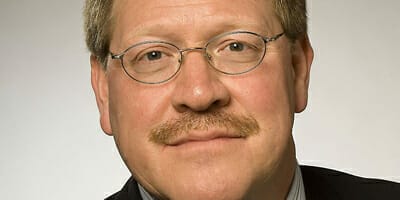Asset owners seeking comfort regarding Europe’s growth prospects had their hopes dashed by an expert panel speaking at the Fiduciary Investors Symposium in Amsterdam. Recovery in Europe, and with it implications for the stability of global market forces, the investment allocations of investors and the political and social well being of EU residents, is still a way off.
Sir David Cooksey, member of the SPV Advisory Council and former director of the Bank of England, argued that Europe’s lack of competitiveness and moribund banking sector remain hurdles to recovery.
The high unit labour costs in all countries relative to Germany lies at the heart of the continent’s inability to compete. It’s led to a process of “internal devaluation” where most European countries have “pushed down their unit labour costs by reducing their amount of labour.”
Cooksey adds: “Europe has to make itself more competitive. It can’t go on spending and taking out credit while not competing in world markets.” He identifies a two-stage Europe with the overwhelming majority of economic growth coming from Germany and Netherlands. “There is nothing to show that things are getting better,” he cautions. “And it is no good thinking Europe can muddle along. European countries need to compete with each other – and against Germany in particular,” he says.
Cooksey also urges banks to do more to dispose of their non-core assets. Governments “pouring” more regulation on banks, asking that they hold “enormous amounts” of extra capital, makes it all the more important for banks to focus on core lending. Unless they free up capital, redeploying assets into what is going to prompt growth will be more difficult, he says.
Similarly Sharan Burrow, general secretary of the International Trade Union Confederation argued the key to growth in Europe, which she says is still “a long way off” is “jobs, jobs, jobs.”
Not only is growth weak but unemployment is at pre-crisis levels. She says that 60 per cent of the labour employed in the global work force is in formal jobs with 40 per cent in the informal sector.
“There is no sustainability in this equation,” she warns. Statistics from the OECD also show inequality has increased with disposable incomes in the UK at 1997 levels. In Germany 40 per cent of the population earn less than they did 15 years ago, while in the US incomes are at a 35-year low.
Burrow also urges banks draw a line between investment and speculation. “Banks drive me crazy,” she says, adding that they are too concentrated and have “thrown too much money” into anti-regulatory initiatives. She urges asset owners to invest in infrastructure, the green economy and the care economy including education and health, and urges for new pools of capital for SMEs. She calls for better disclosure by investors. “It is imperative we know where our money is invested,” she says. “Only then can we talk about the risk and outcomes.”
Sony Kapoor, managing director at think tank Re-Define and an advisor to long-term investors, told gathered delegates that they were also responsible for the problems facing Europe’s banks.
“It’s your fault,” he said. “You sit on their boards and allowed them to invest in silly assets.” He also urged asset owners to set more realistic return targets. “You are collectively blind,” he said in reference to the contradiction between today’s global environment, and asset owners continuing to target returns of 8-9 per cent. He urged long-term investors to contribute more to the ongoing debate around regulation and recovery saying they are “missing in action.”
Investors “faced a choice” at the beginning of the crisis when they could “have bitten the bullet” and allocated losses at the point the crisis occurred. Instead they chose to slowly allocate losses over time. The result, Kapoor argues, is additional cost. He also urged investors to invest more in alternatives, particularly the green economy. “Good investment opportunities do exist,” he says.




